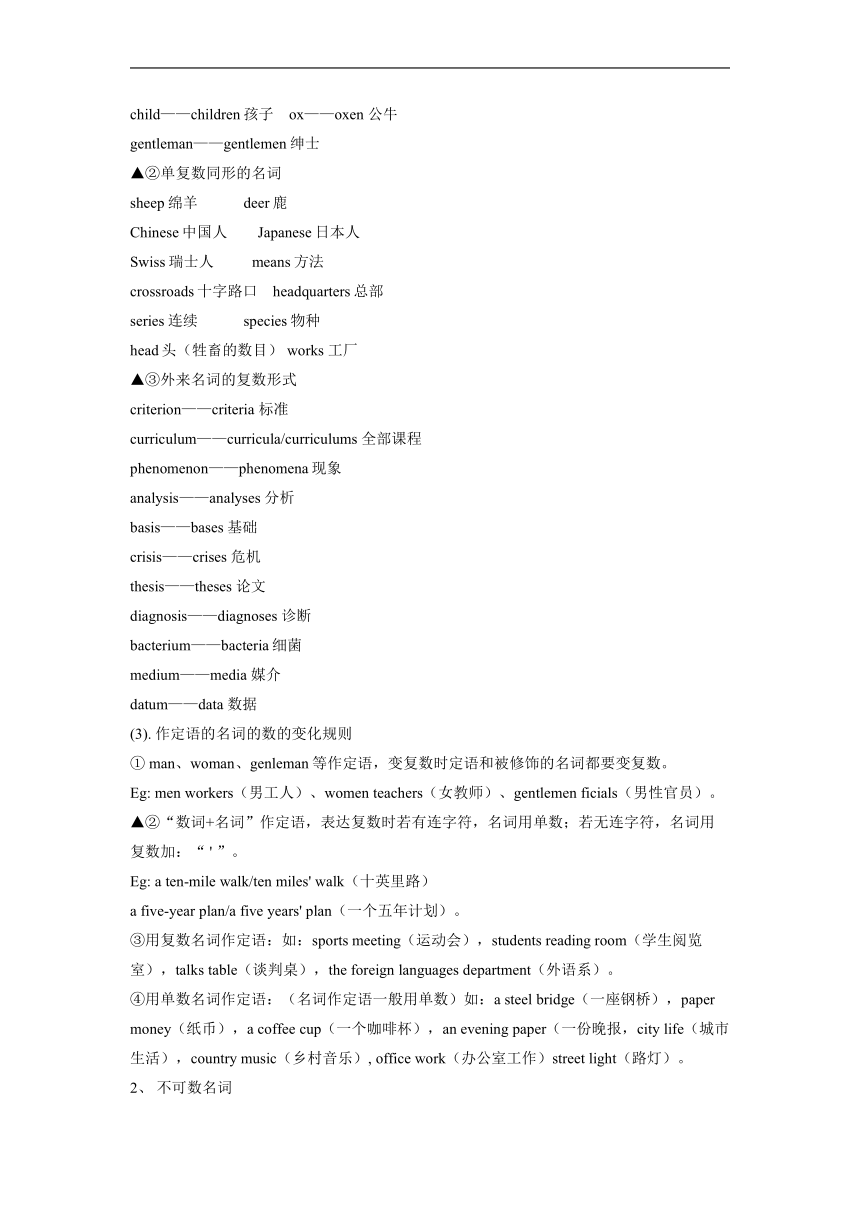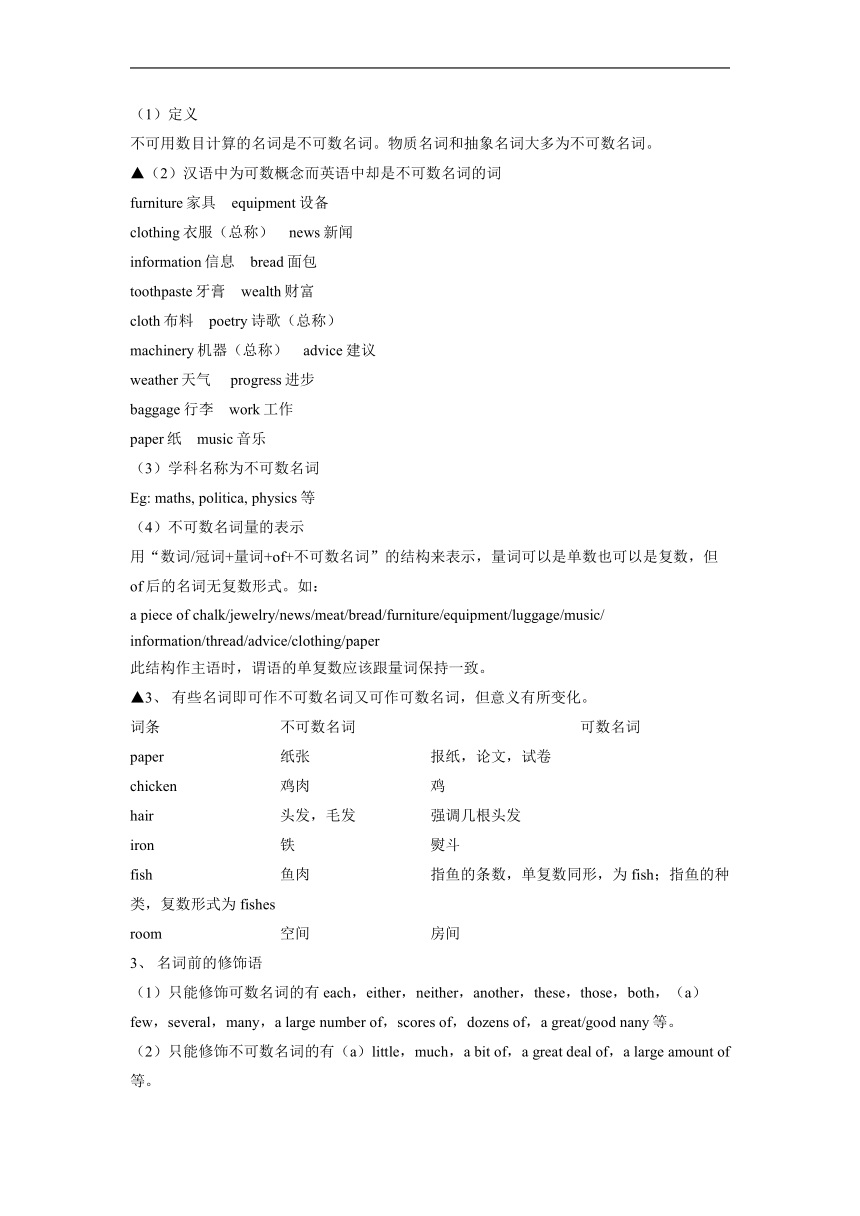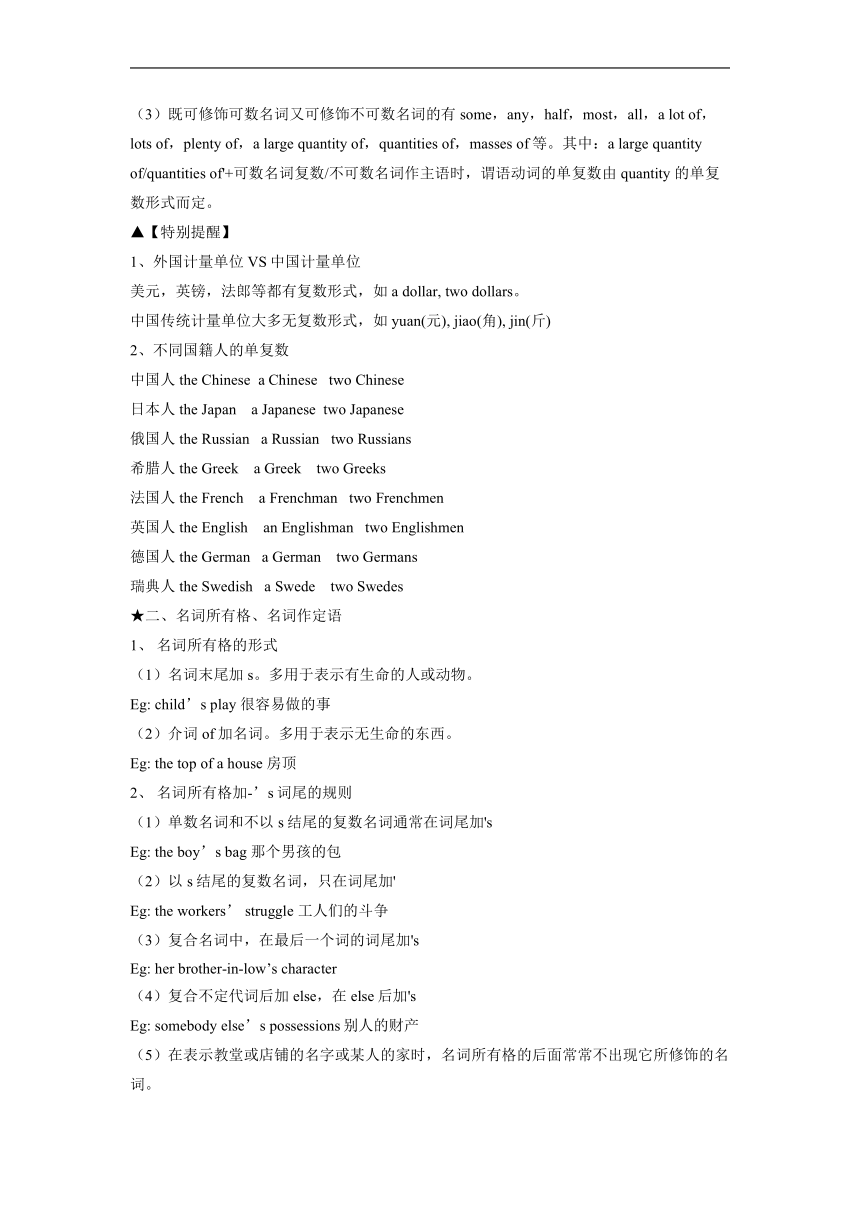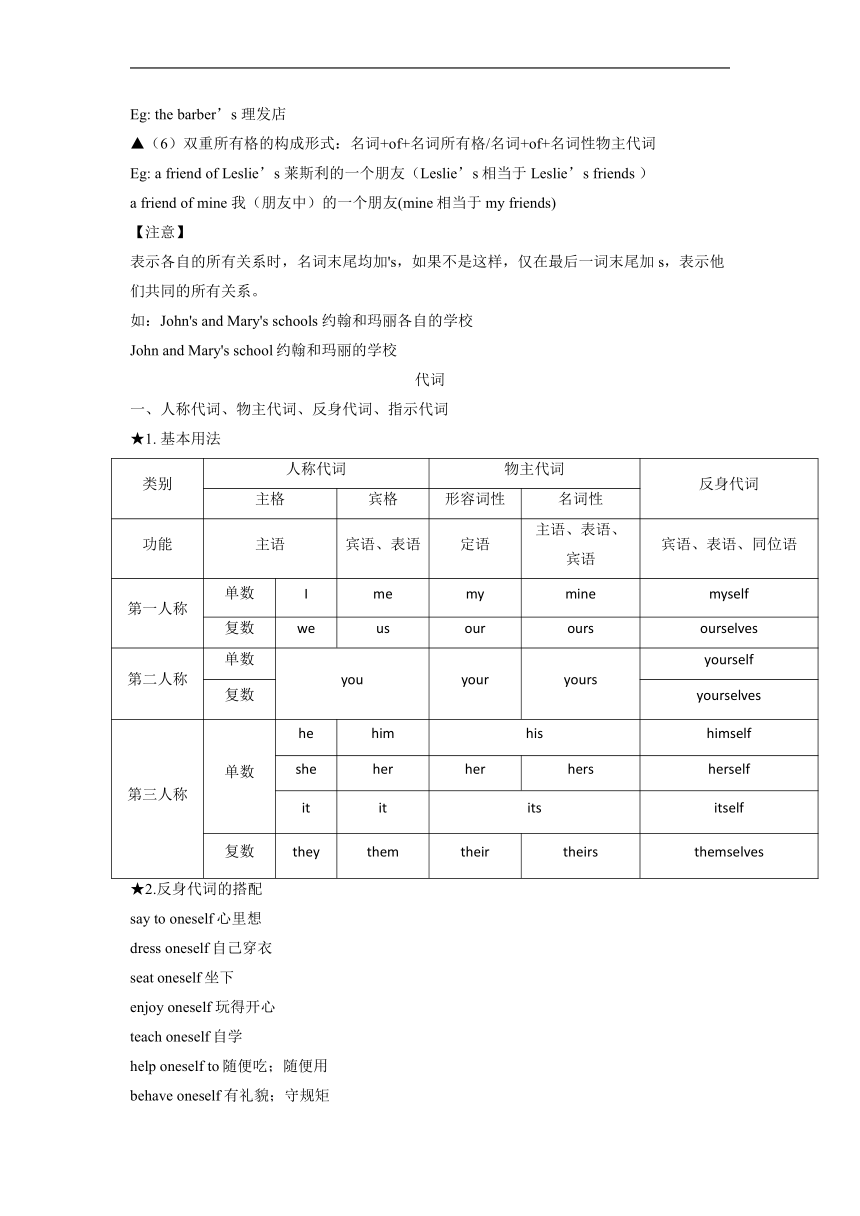2023届高考英语二轮复习:名词和代词讲义(含答案)
文档属性
| 名称 | 2023届高考英语二轮复习:名词和代词讲义(含答案) |  | |
| 格式 | docx | ||
| 文件大小 | 42.2KB | ||
| 资源类型 | 教案 | ||
| 版本资源 | 人教版(2019) | ||
| 科目 | 英语 | ||
| 更新时间 | 2022-10-11 18:18:04 | ||
图片预览





文档简介
名词和代词
I 知识衔接
名词
一、名词的数
1、 可数名词单数变复数规则
(1)规则变化
①一般情况下,在词尾直接加s。
Eg: book——books cap——caps
②以s, x, ch, sh结尾的名词,在词尾加es
Eg: glass——glasses box——boxes
watch——watches brush——brushes
③以辅音字母加y结尾的名词,把y改为i, 再加es
Eg: story——stories country——countries
④以o结尾的名词变为复数时,一般直接加s.但中学英语中有些名词要加es(一般有生命的物体加es),他们是黑人英雄爱吃土豆和西红柿。
Eg:radio——radios photo——photos
Negro——Negroes hero——heroes
potato——potatoes tomato——tomatoes
⑤以f或fe结尾的名词变为复数时,一般直接加s,但有些以f或fe结尾的名词需把f或fe去掉,加ves,它们是:为了自己的牛犊活命,小偷和他的妻子手里拿着刀子和一片树叶站在架子上,把狼劈成两半。
Eg: roof——roofs belief——beliefs
self——selves calf——calves
life——lives thief——thieves
wife——wives knife——knives
leaf——leaves shelf——shelves
wolf——wolves half——halves
⑥复合名词变复数时,通常只将里面所含的主体名词变为复数。如果没有主体名词,则将最后一部分变为复数。
son-in-law——sons-in-law
storyteller——storytellers
(2).不规则变化
①单复数不同形的名词
foot——feet脚 man——men男人
woman——women女人 mouse——mice老鼠
tooth——teeth牙 goose——geese 鹅
child——children孩子 ox——oxen 公牛
gentleman——gentlemen绅士
▲②单复数同形的名词
sheep绵羊 deer鹿
Chinese中国人 Japanese日本人
Swiss瑞士人 means方法
crossroads十字路口 headquarters总部
series连续 species物种
head头(牲畜的数目) works 工厂
▲③外来名词的复数形式
criterion——criteria 标准
curriculum——curricula/curriculums 全部课程
phenomenon——phenomena现象
analysis——analyses 分析
basis——bases 基础
crisis——crises 危机
thesis——theses 论文
diagnosis——diagnoses 诊断
bacterium——bacteria细菌
medium——media 媒介
datum——data 数据
(3). 作定语的名词的数的变化规则
① man、woman、genleman等作定语,变复数时定语和被修饰的名词都要变复数。
Eg: men workers(男工人)、women teachers(女教师)、gentlemen ficials(男性官员)。
▲②“数词+名词”作定语,表达复数时若有连字符,名词用单数;若无连字符,名词用复数加:“ ' ”。
Eg: a ten-mile walk/ten miles' walk(十英里路)
a five-year plan/a five years' plan(一个五年计划)。
③用复数名词作定语:如:sports meeting(运动会),students reading room(学生阅览室),talks table(谈判桌),the foreign languages department(外语系)。
④用单数名词作定语:(名词作定语一般用单数)如:a steel bridge(一座钢桥),paper money(纸币),a coffee cup(一个咖啡杯),an evening paper(一份晚报,city life(城市生活),country music(乡村音乐), office work(办公室工作)street light(路灯)。
2、 不可数名词
(1)定义
不可用数目计算的名词是不可数名词。物质名词和抽象名词大多为不可数名词。
▲(2)汉语中为可数概念而英语中却是不可数名词的词
furniture家具 equipment设备
clothing衣服(总称) news新闻
information信息 bread面包
toothpaste牙膏 wealth财富
cloth布料 poetry诗歌(总称)
machinery机器(总称) advice建议
weather天气 progress进步
baggage行李 work工作
paper纸 music音乐
(3)学科名称为不可数名词
Eg: maths, politica, physics等
(4)不可数名词量的表示
用“数词/冠词+量词+of+不可数名词”的结构来表示,量词可以是单数也可以是复数,但of后的名词无复数形式。如:
a piece of chalk/jewelry/news/meat/bread/furniture/equipment/luggage/music/
information/thread/advice/clothing/paper
此结构作主语时,谓语的单复数应该跟量词保持一致。
▲3、 有些名词即可作不可数名词又可作可数名词,但意义有所变化。
词条 不可数名词 可数名词
paper 纸张 报纸,论文,试卷
chicken 鸡肉 鸡
hair 头发,毛发 强调几根头发
iron 铁 熨斗
fish 鱼肉 指鱼的条数,单复数同形,为fish;指鱼的种类,复数形式为fishes
room 空间 房间
3、 名词前的修饰语
(1)只能修饰可数名词的有each,either,neither,another,these,those,both,(a)few,several,many,a large number of,scores of,dozens of,a great/good nany等。
(2)只能修饰不可数名词的有(a)little,much,a bit of,a great deal of,a large amount of等。
(3)既可修饰可数名词又可修饰不可数名词的有some,any,half,most,all,a lot of,lots of,plenty of,a large quantity of,quantities of,masses of等。其中:a large quantity of/quantities of'+可数名词复数/不可数名词作主语时,谓语动词的单复数由quantity 的单复数形式而定。
▲【特别提醒】
1、外国计量单位VS中国计量单位
美元,英镑,法郎等都有复数形式,如a dollar, two dollars。
中国传统计量单位大多无复数形式,如yuan(元), jiao(角), jin(斤)
2、不同国籍人的单复数
中国人the Chinese a Chinese two Chinese
日本人the Japan a Japanese two Japanese
俄国人the Russian a Russian two Russians
希腊人the Greek a Greek two Greeks
法国人the French a Frenchman two Frenchmen
英国人the English an Englishman two Englishmen
德国人the German a German two Germans
瑞典人the Swedish a Swede two Swedes
★二、名词所有格、名词作定语
1、 名词所有格的形式
(1)名词末尾加s。多用于表示有生命的人或动物。
Eg: child’s play 很容易做的事
(2)介词of加名词。多用于表示无生命的东西。
Eg: the top of a house 房顶
2、 名词所有格加-’s词尾的规则
(1)单数名词和不以s结尾的复数名词通常在词尾加's
Eg: the boy’s bag 那个男孩的包
(2)以s结尾的复数名词,只在词尾加'
Eg: the workers’ struggle 工人们的斗争
(3)复合名词中,在最后一个词的词尾加's
Eg: her brother-in-low’s character
(4)复合不定代词后加else,在else后加's
Eg: somebody else’s possessions别人的财产
(5)在表示教堂或店铺的名字或某人的家时,名词所有格的后面常常不出现它所修饰的名词。
Eg: the barber’s 理发店
▲(6)双重所有格的构成形式:名词+of+名词所有格/名词+of+名词性物主代词
Eg: a friend of Leslie’s 莱斯利的一个朋友(Leslie’s相当于Leslie’s friends )
a friend of mine 我(朋友中)的一个朋友(mine相当于my friends)
【注意】
表示各自的所有关系时,名词末尾均加's,如果不是这样,仅在最后一词末尾加s,表示他们共同的所有关系。
如:John's and Mary's schools 约翰和玛丽各自的学校
John and Mary's school约翰和玛丽的学校
代词
一、人称代词、物主代词、反身代词、指示代词
★1. 基本用法
类别 人称代词 物主代词 反身代词
主格 宾格 形容词性 名词性
功能 主语 宾语、表语 定语 主语、表语、宾语 宾语、表语、同位语
第一人称 单数 I me my mine myself
复数 we us our ours ourselves
第二人称 单数 you your yours yourself
复数 yourselves
第三人称 单数 he him his himself
she her her hers herself
it it its itself
复数 they them their theirs themselves
★2.反身代词的搭配
say to oneself心里想
dress oneself自己穿衣
seat oneself坐下
enjoy oneself 玩得开心
teach oneself自学
help oneself to随便吃;随便用
behave oneself有礼貌;守规矩
of oneself自动地
in oneself本质上,本身
by oneself独自,单独
for oneself替自己,为自己
to oneself独自拥有的
beside oneself(因情绪)失去自制力,失常
adapt oneself to适应
apply oneself to专心致志于
devote oneself to致力于,献身于,专心于
make oneself at home舒适自在,无拘束
treat oneself to招待,款待,买(可享受的东西)
3.指示代词this, that, these, those的用法
指示代词 用法
this/that 指在时间或空间上较近的人或事物,this也可指下文将要谈到的人或物,起启下的作用
that/those 指在时间或空间上较远的人或事物;that也可指上文提到过的人或物,起承上的作用
例:
What I want to say is this: you should grasp every minute to finish your work.
我想说的是:你应该抓住每一分钟来完成你的工作。
二、it的用法
1、it的指代用法
(1)指代上文提到的某样东西
Eg:
Where is my dictionary I left it right on the desk.
我的字典在哪里?我就把它放在书桌上了。
(2)用以代替指示代词this, that
Eg:
——What’s this ——这是什么?
——It’s a flag. ——它是一面旗。
(3)指代不知性别的婴儿(baby)或身份不明确的人(由于某种原因而不知道对方是谁)
Eg:
The baby cried because it was hungry.
这个婴儿因饥饿而啼哭。
—Who is knocking at the door
—It might be the postman。
——谁在敲门?
——可能是邮递员。
(4)指代时间、距离、天气、气候、环境或温度。
Eg:
It is nine o’clock sharp now.现在是九点整。
It is raining hard outside. 外面雨下的正大。
It is a long way to the factory.到工厂有很长一段路。
It’s very noisy in the room.屋里噪音很大。
★(5)it常用来代替不定式、动名词短语或名词性从句作形式主语或形式宾语,而将真正的主语或宾语后置。
Eg:
It's not easy to learn a foreign language.
学习一门外语不容易。(代替不定式短语形式主语)
I have made it clear that nobody is allowed to smoke here.
我已经讲得很清楚了,任何人都不准在这儿吸烟。(代替名词性从句作形式宾语)
★2. It 作形式主语、形式宾语常用句型
(1)it作形式主语
It is a pity/shame that...真可惜……
It is no wonder that... ……不足为奇,并不奇怪
It seems/appears that...似乎/看来……
It looks/seems as if/as that...看起来/似乎/好像……
It happens that...碰巧……
It occurs to/comes to/strikes/hits sb. that...某人突然想起……
It is said/reported that… 据说/据报道.....
It is certain that… 肯定.....
It is well-known that... 众所周知.....
It is no use/no good doing sth. 做某事没用/没好处
It takes sb. some time to do sth. 做某事花某人多长时间
(2)it 作形式宾语
主语+ think/believe/suppose/consider/feel/make/keep...+it+adj./n.+for/of+sb.to do sth./that 从句
主语+ think/believe/suppose/consider/feel/make/keep...+it+adj./no use/no good doing …doing sth.
3.与it相关的常用短语和句型
(1)I take it that you don't agree with me.
我想你不同意我的意见。
(2)I hate it when I have to speak in French on the phone.
当我非得用法语打电话时,我感到厌烦。
(3)I like it when she sings a song to me.
我喜欢她为我唱歌。
(4)I can't help it if he is always late.
如果他总是迟到,我也没办法。
(5)1 would appreciate it if you could help me.
如果你能帮助我,我将不胜感激。
(6)Please see to it that(make sure that)you bring enough money when you go out.出门时,请确保带足了钱。
(7)You can depend upon it that he is very smart.
你就相信吧,他非常聪明。
(8)As someone puts it,practice makes perfect.
正如某人所说,熟能生巧。
(9)When it comes to drive,she's got more than any of us.
讲干劲,她比谁都足。
(10)It is(high)time that we had/should have lunch.
该吃午饭了。
(11)It is the first/second...time I have visited the place.
这是我第一/二……次参观这个地方。
(12)It is/has been 3 years since he joined the army.
他参军3年了。
(13)It was 3 years before he came back home.
3年了他才回家。
(14)It is I who/that am right.
我是对的。
4.用于强调句型“It is/was+被强调部分+that/who…”
例:
John's success has nothing to do with good luck. It is years of hard work that has made him what he is today.
约翰的成功和好运气没关系。是多年的努力工作才使他有了今天。
三、不定代词的区分
1. both, all, either, any, neither, none的区别
指代 词义 都 任何一个 都不
两个人或物 both either neither
三个或三个以上的人或物 all any none
Eg: I've bought two books;you can have either.
我买了两本书,你要哪本都行。
Any child who breaks the rules will be punished.
凡违反规定的孩子都要受罚。
None of these pens works/work.
这些钢笔没有一支能用。
2. another, the other, others, the others的区别
代词 用法 例句
another 指三者或三者以上 I don't like this room. I'm going to ask for another. 我不喜欢这个房间。我打算另要一间。
the other 特指两者中的另一个,常用在“one…, the other…”结构中 If you match that glove against this one,you will find that one is slightly lighter than the other. 假如你把那只手套和这只手套进行比较,你会发现一只比另一只的颜色略微淡一点。
others 泛指别的人或物,常用在“some…,others…”结构中 Some students are cleaning the classroom;others are playing on the playground. 一些学生在打扫教室,另外一些学生在操场上玩。
the others 特指其余的所有的人或物 She's not less capable than the others in the class. 她的能力并不比班里其他人弱。
注意:
(1)the other通常还可作定语修饰可数名词,修饰可数名词复数时,表示“其余所有的”。
Eg:
All the other students are here;only he is absent today.
其他学生都在这里,今天只有他缺席了。
(2)another后还可跟“基数词/few+可数名词复数”表示“另外几个……”
another+基数词+可数名词复数=基数词+more+可数名词复数。
Eg:
I have been here for two weeks and I will stay here for another three weeks(= three more weeks).
我在这里已经待了两周了,我还要在这儿再待三周。
(3)other作定语,常与可数名词复数连用;前面若有the,some,any,each,every,no以及形容词性物主代词时,也可与可数名词单数或不可数名词连用。如:I don't like this colour. Have you got any other colour?
我不喜欢这种颜色,你还有其他颜色吗?
3.nobody/no one, nothing, none的区别
代词 指代 用来回答 相当于 是否加of短语
nobody/no one 人 who not anybody not anyone 否
nothing 物 what not anything 否
none 人或物 how many how much not a/an/any+名词或no+名词 是
Eg:
1. As we were asleep, none of us heard the sound.
由于我们都睡着了,所以我们当中没人听到那个声音。
2. I wish I could offer you some cake but there's none left.
我真想能请你吃些蛋糕,但一点儿也没剩下。
4. many, much, few, little, a few, a little的区别
多 少
复数名词概念 many few
不可数名词概念 much little
肯定 否定
复数名词概念 a few few
不可数名词概念 a little little
注意:
1. only a few=few; only a little=little; quite a few=many; quite a little=much
2. many,much,(a)few,(a) little作代词后加of短语时,of后的名词或代词必须是特定的。
Eg:
今天这些人中有很多缺席了。
Many of people are absent today.(×)
Many of the people are absent today.(√)
3. a little与a bit 都可指代或修饰不可数名词,也可作状语。a little 直接修饰不可数名词,而a bit后需加of;作状语时,都表示程度,意义相同,但是not a little意为“很”,而not a bit意为“一点也不”。
Eg: There's only a bit of/a little room left for the piano.
屋子里仅有一点地方放这架钢琴。
He is a little/a bit angry.他有点生气。
He is not a bit angry.他一点也不生气。
He is not a little angry.他非常生气。
5. one, ones, the one, the ones, those(指示代词),that(指示代词)的区别
(1)one vs ones
one可用a/an+单数名词替代。
Eg:
We have various summer camps for your holiday. You can choose one(=a summer camp)based on your own interest.
我们为您的假期提供了各种各样的夏令营,您可以根据自己的兴趣选择一种。
ones可用零冠词+复数名词替代
Eg:
Mr. Zhang gave me many valuable presents,ones(= presents)that I had never seen.张先生给了我很多贵重的礼物,这些(礼物)是我从来没见过的。
(2)the one vs the ones
the one可用the+单数名词替代
Eg:
The book on the desk is better than the one/that(=the book) under the desk.
桌子上的那本书比桌下的那本书好。
the ones可用the+复数名词替代
Eg:
The books on the desk are better than the ones/those(= the books)under the desk.
桌子上的那些书比桌子下的那些书好。
(3)those vs that
those可用the+复数名词(尤其是有后置定语时)
Eg:
The books on the desk are better than the ones/those(= the books)under the desk.
桌子上的那些书比桌子下的那些书好。
that可用the+单数名词/不可数名词(尤其是有后置定语时)
Eg:
Little joy can equal that(= the joy)of a surprising ending when you read stories.
几乎没有什么乐趣能比得上在阅读故事时读到一个出乎意料的结局时的乐趣。
6.含复合不定代词的习惯用语。
He is nothing but a clerk.他只是一名职员。
He is anything but a clerk.他根本不是一名职员。
She is something of a doctor. She has saved many lives.
她算得上是一位医生。她救了很多人的命。
He is a scientist or something.
他是科学家之类的人物。
Your house is something like ours.
你们的房子有点像我们的。
They get something like 97%renewals every year.
他们每年差不多有97%的用户续订。
7. 全部肯定,部分肯定或全部否定
全部肯定 部分否定 全部否定
both not出现在含有表示全部肯定的不定代词的句子中 neither
all(+名词) none; not any(+名词);no+名词
everybody/everyone;everything;every+名词 nobody/no one;nothing
Eg:
Not all of them smoke=All of them don’t smoke.
他们当中不是所有的人都抽烟。
四、疑问代词what的用法
(1)What常用于询问他人的职业、外貌、性格特征等。
You have met our new teacher. What does he look like
你已经见过我们的新老师了。他长什么样子?
(2)what常用句式
What is the height/weight/depth/width/length/size
高度/重量/深度/宽度/长度/尺寸是多少?
What is the population
人口是多少?
What is the distance
距离是多远?
What is the price
价格是多少?
What is your address
你住哪里?
What is your attitude
你的态度是怎样的?
II 习题衔接
1.He accepted the challenging task ________ to him without hesitation and promised to complete the ________ on time. (assign) (所给词的适当形式填空)
2.She equals him in mental power but not in physical (体力).
3.Many countries are taking effective (措施)to prevent COVID-19 from spreading.
4.The driver of the truck suffered (损伤)to his legs and arms in the accident.
5.Rescue dogs have a very good sense of smell and are often used to search for s earthquake.
6.This cellphone will be repaired free of charge when it is under g______ without human damage. (根据首字母单词拼写)
7.My mother sends her ___________(greet) to you all.
8.Take note of their contact numbers in the _________(announce) pages.
9.What _________(evident) was there that Old Tom was helping the whalers out
10.Sometimes adjusting your own attitude plays a more important role than physical ______(treat) in getting rid of diseases.
11.Obviously, ________ the poet wants to express is his deep love for his country.(用适当的词填空)
12.________so happened that what she has just said corresponds to my opinion.(用适当的词填空)
13.The physical stores find ______ much harder to survive when they are in competition with online stores.
14._______ puzzles me most is whether they really share the same interests.
15.The fast development of cyberspace has been changing the manner in _______ we live.
16.No joy can match ______ of a hot water bath in a cold winter day.
17.I will appreciate ______ if you could guarantee me a chance of interview.
18.______ matters a lot to stimulate the learning interest of the students.
19.______ never occurred to me that failure may arise from such a little mistake.
20.We are informed our tasks are critical to the programme and ______ we must hand in them on time.
答案
1.答案:①. assigned ②. assignment
解析: assign"分派”"是及物动词,设空一修饰前面名词task,且task与assign之间为被动关系,应用过去分词assigned,作后置定语;设空二作宾语,且有定冠词修饰,应用assignment,表示"工作;任务”,可数名词,这里特指“这项任务”,所以用单数形式。
故填:assigned;assignment。
2.答案:strength
解析:考查名词。句意:她的智力和他相当,但体力不如他。根据汉语提示“体力”可知此处应填不可数名词strength。故填strength。
3.答案:measures
解析:考查名词。句意:许多国家都在采取有效措施防止疫情蔓延。take measures to do sth. “ 采取措施做某事”为固定短语。故填measures。
4.答案:injuries
解析:考查名词。句意:在这次事故中,卡车司机的腿和胳膊都受了伤。根据汉语提示及句意可知,此处使用名词injury,由his legs and arms可知,不止一处受伤,应用名词复数。故填injuries。
5.答案:survivors
解析:考查名词。句意:救援犬的嗅觉非常灵敏,经常被用来搜寻地震中的幸存者。句中用名词作search for的宾语。survivor幸存者,为可数名词,所以用复数形式。根据首字母提示及句意,故填survivors。
6.答案:guarantee
解析:考查名词。句意:这部手机在保修期内将免费维修,如果不是人为损坏的话。名词guarantee作介词under的宾语,under guarantee(在保修期内)。故填guarantee
7.答案:greetings
解析:句意:我妈妈向你们大家问好。 greet动词,问候,它的名词形式是在动词后加ing,表示问候时常用复数形式,故填greetings.
8.答案:announcement
解析:名词形容词转化。根据判断,可以发现本空应填入名词,大意:公告栏,故应将动词announce转化为名词。故答案为announcement。句意:在公告页面记下他们的联系电话。
9.答案:evidence
解析:名词形容词转化。陈述句是there was _____ that old Tom was helping the whalers out,可以发现本空应填名词,故应将形容词evident转化为名词。故答案为evidence。句意:有什么证据表明老汤姆在帮助捕鲸者?
10.答案:treatment
解析:结合形容词physical可知, 此处应填名词作为介词than的宾语, treatment意为"治疗"时是抽象名词, 不可数, 故填treatment。
11.答案:what
解析:句意:显然,这位诗人想要表达的是他对祖国的深深爱。空处引导主语从句,连接词作动词express的宾语,表示"所……的事(物)”,应用连接代词what。故填:what.
12.答案:It
解析:句意:她刚才所说的恰好符合我的意见。it so happens that…是一个句型,意为"真凑巧,巧的是”。故填:It。
13.答案:it
解析:句意为: 在与网店竞争时, 实体店认为(自身)很难生存下去。find后缺少宾语, 其真正的宾语为后面的不定式短语to survive when they are in competition with online stores, 设空处应填it作形式宾语。
14.答案:What
解析:句意为: 最让我困惑的是他们是否真的有相同的兴趣。根据句意和句子成分划分可知, 设空处引导主语从句, 在从句中作主语, 意为"......的是......", 故填写What作引导词。
15.答案:which
解析:句意为: 网络空间的快速发展一直在改变着我们生活的方式。根据句子成分划分可知, 设空处及其前的介词in共同引导定语从句, 先行词为manner, 指物, 故填关系代词which。
16.答案:that
解析:句意为: 没有什么快乐可以和寒冷冬日里洗一个热水澡的快乐相匹敌。设空处考查代词that的用法, 代指前面的不可数名词joy。
17.答案:it
解析:句意为: 如果您能给我一次面试的机会, 我将感激不尽。I will appreciate it if...为固定句式, 意为"如果......我将感激不尽"。
18.答案:It
解析:句意为: 激发学生的学习兴趣, 这一点尤为重要。设空处应用It作形式主语, 后面的不定式结构为句子真正的主语。
19.答案:It
解析:句意为: 我从不曾想到失败可能源于如此微小的错误。根据句子成分划分可知, 设空处应用It作形式主语, that引导的主语从句作真正的主语。
20.答案:that
解析:句意为: 我们接到通知, 我们的工作对该计划至关重要, 且我们必须按时提交。句中出现由and连接的两个或两个以上的宾语从句时, 只有第一个that可以省略。根据句子成分划分可知, 第二个宾语从句中不缺少成分, 语义完整, 故设空处填引导词that。
I 知识衔接
名词
一、名词的数
1、 可数名词单数变复数规则
(1)规则变化
①一般情况下,在词尾直接加s。
Eg: book——books cap——caps
②以s, x, ch, sh结尾的名词,在词尾加es
Eg: glass——glasses box——boxes
watch——watches brush——brushes
③以辅音字母加y结尾的名词,把y改为i, 再加es
Eg: story——stories country——countries
④以o结尾的名词变为复数时,一般直接加s.但中学英语中有些名词要加es(一般有生命的物体加es),他们是黑人英雄爱吃土豆和西红柿。
Eg:radio——radios photo——photos
Negro——Negroes hero——heroes
potato——potatoes tomato——tomatoes
⑤以f或fe结尾的名词变为复数时,一般直接加s,但有些以f或fe结尾的名词需把f或fe去掉,加ves,它们是:为了自己的牛犊活命,小偷和他的妻子手里拿着刀子和一片树叶站在架子上,把狼劈成两半。
Eg: roof——roofs belief——beliefs
self——selves calf——calves
life——lives thief——thieves
wife——wives knife——knives
leaf——leaves shelf——shelves
wolf——wolves half——halves
⑥复合名词变复数时,通常只将里面所含的主体名词变为复数。如果没有主体名词,则将最后一部分变为复数。
son-in-law——sons-in-law
storyteller——storytellers
(2).不规则变化
①单复数不同形的名词
foot——feet脚 man——men男人
woman——women女人 mouse——mice老鼠
tooth——teeth牙 goose——geese 鹅
child——children孩子 ox——oxen 公牛
gentleman——gentlemen绅士
▲②单复数同形的名词
sheep绵羊 deer鹿
Chinese中国人 Japanese日本人
Swiss瑞士人 means方法
crossroads十字路口 headquarters总部
series连续 species物种
head头(牲畜的数目) works 工厂
▲③外来名词的复数形式
criterion——criteria 标准
curriculum——curricula/curriculums 全部课程
phenomenon——phenomena现象
analysis——analyses 分析
basis——bases 基础
crisis——crises 危机
thesis——theses 论文
diagnosis——diagnoses 诊断
bacterium——bacteria细菌
medium——media 媒介
datum——data 数据
(3). 作定语的名词的数的变化规则
① man、woman、genleman等作定语,变复数时定语和被修饰的名词都要变复数。
Eg: men workers(男工人)、women teachers(女教师)、gentlemen ficials(男性官员)。
▲②“数词+名词”作定语,表达复数时若有连字符,名词用单数;若无连字符,名词用复数加:“ ' ”。
Eg: a ten-mile walk/ten miles' walk(十英里路)
a five-year plan/a five years' plan(一个五年计划)。
③用复数名词作定语:如:sports meeting(运动会),students reading room(学生阅览室),talks table(谈判桌),the foreign languages department(外语系)。
④用单数名词作定语:(名词作定语一般用单数)如:a steel bridge(一座钢桥),paper money(纸币),a coffee cup(一个咖啡杯),an evening paper(一份晚报,city life(城市生活),country music(乡村音乐), office work(办公室工作)street light(路灯)。
2、 不可数名词
(1)定义
不可用数目计算的名词是不可数名词。物质名词和抽象名词大多为不可数名词。
▲(2)汉语中为可数概念而英语中却是不可数名词的词
furniture家具 equipment设备
clothing衣服(总称) news新闻
information信息 bread面包
toothpaste牙膏 wealth财富
cloth布料 poetry诗歌(总称)
machinery机器(总称) advice建议
weather天气 progress进步
baggage行李 work工作
paper纸 music音乐
(3)学科名称为不可数名词
Eg: maths, politica, physics等
(4)不可数名词量的表示
用“数词/冠词+量词+of+不可数名词”的结构来表示,量词可以是单数也可以是复数,但of后的名词无复数形式。如:
a piece of chalk/jewelry/news/meat/bread/furniture/equipment/luggage/music/
information/thread/advice/clothing/paper
此结构作主语时,谓语的单复数应该跟量词保持一致。
▲3、 有些名词即可作不可数名词又可作可数名词,但意义有所变化。
词条 不可数名词 可数名词
paper 纸张 报纸,论文,试卷
chicken 鸡肉 鸡
hair 头发,毛发 强调几根头发
iron 铁 熨斗
fish 鱼肉 指鱼的条数,单复数同形,为fish;指鱼的种类,复数形式为fishes
room 空间 房间
3、 名词前的修饰语
(1)只能修饰可数名词的有each,either,neither,another,these,those,both,(a)few,several,many,a large number of,scores of,dozens of,a great/good nany等。
(2)只能修饰不可数名词的有(a)little,much,a bit of,a great deal of,a large amount of等。
(3)既可修饰可数名词又可修饰不可数名词的有some,any,half,most,all,a lot of,lots of,plenty of,a large quantity of,quantities of,masses of等。其中:a large quantity of/quantities of'+可数名词复数/不可数名词作主语时,谓语动词的单复数由quantity 的单复数形式而定。
▲【特别提醒】
1、外国计量单位VS中国计量单位
美元,英镑,法郎等都有复数形式,如a dollar, two dollars。
中国传统计量单位大多无复数形式,如yuan(元), jiao(角), jin(斤)
2、不同国籍人的单复数
中国人the Chinese a Chinese two Chinese
日本人the Japan a Japanese two Japanese
俄国人the Russian a Russian two Russians
希腊人the Greek a Greek two Greeks
法国人the French a Frenchman two Frenchmen
英国人the English an Englishman two Englishmen
德国人the German a German two Germans
瑞典人the Swedish a Swede two Swedes
★二、名词所有格、名词作定语
1、 名词所有格的形式
(1)名词末尾加s。多用于表示有生命的人或动物。
Eg: child’s play 很容易做的事
(2)介词of加名词。多用于表示无生命的东西。
Eg: the top of a house 房顶
2、 名词所有格加-’s词尾的规则
(1)单数名词和不以s结尾的复数名词通常在词尾加's
Eg: the boy’s bag 那个男孩的包
(2)以s结尾的复数名词,只在词尾加'
Eg: the workers’ struggle 工人们的斗争
(3)复合名词中,在最后一个词的词尾加's
Eg: her brother-in-low’s character
(4)复合不定代词后加else,在else后加's
Eg: somebody else’s possessions别人的财产
(5)在表示教堂或店铺的名字或某人的家时,名词所有格的后面常常不出现它所修饰的名词。
Eg: the barber’s 理发店
▲(6)双重所有格的构成形式:名词+of+名词所有格/名词+of+名词性物主代词
Eg: a friend of Leslie’s 莱斯利的一个朋友(Leslie’s相当于Leslie’s friends )
a friend of mine 我(朋友中)的一个朋友(mine相当于my friends)
【注意】
表示各自的所有关系时,名词末尾均加's,如果不是这样,仅在最后一词末尾加s,表示他们共同的所有关系。
如:John's and Mary's schools 约翰和玛丽各自的学校
John and Mary's school约翰和玛丽的学校
代词
一、人称代词、物主代词、反身代词、指示代词
★1. 基本用法
类别 人称代词 物主代词 反身代词
主格 宾格 形容词性 名词性
功能 主语 宾语、表语 定语 主语、表语、宾语 宾语、表语、同位语
第一人称 单数 I me my mine myself
复数 we us our ours ourselves
第二人称 单数 you your yours yourself
复数 yourselves
第三人称 单数 he him his himself
she her her hers herself
it it its itself
复数 they them their theirs themselves
★2.反身代词的搭配
say to oneself心里想
dress oneself自己穿衣
seat oneself坐下
enjoy oneself 玩得开心
teach oneself自学
help oneself to随便吃;随便用
behave oneself有礼貌;守规矩
of oneself自动地
in oneself本质上,本身
by oneself独自,单独
for oneself替自己,为自己
to oneself独自拥有的
beside oneself(因情绪)失去自制力,失常
adapt oneself to适应
apply oneself to专心致志于
devote oneself to致力于,献身于,专心于
make oneself at home舒适自在,无拘束
treat oneself to招待,款待,买(可享受的东西)
3.指示代词this, that, these, those的用法
指示代词 用法
this/that 指在时间或空间上较近的人或事物,this也可指下文将要谈到的人或物,起启下的作用
that/those 指在时间或空间上较远的人或事物;that也可指上文提到过的人或物,起承上的作用
例:
What I want to say is this: you should grasp every minute to finish your work.
我想说的是:你应该抓住每一分钟来完成你的工作。
二、it的用法
1、it的指代用法
(1)指代上文提到的某样东西
Eg:
Where is my dictionary I left it right on the desk.
我的字典在哪里?我就把它放在书桌上了。
(2)用以代替指示代词this, that
Eg:
——What’s this ——这是什么?
——It’s a flag. ——它是一面旗。
(3)指代不知性别的婴儿(baby)或身份不明确的人(由于某种原因而不知道对方是谁)
Eg:
The baby cried because it was hungry.
这个婴儿因饥饿而啼哭。
—Who is knocking at the door
—It might be the postman。
——谁在敲门?
——可能是邮递员。
(4)指代时间、距离、天气、气候、环境或温度。
Eg:
It is nine o’clock sharp now.现在是九点整。
It is raining hard outside. 外面雨下的正大。
It is a long way to the factory.到工厂有很长一段路。
It’s very noisy in the room.屋里噪音很大。
★(5)it常用来代替不定式、动名词短语或名词性从句作形式主语或形式宾语,而将真正的主语或宾语后置。
Eg:
It's not easy to learn a foreign language.
学习一门外语不容易。(代替不定式短语形式主语)
I have made it clear that nobody is allowed to smoke here.
我已经讲得很清楚了,任何人都不准在这儿吸烟。(代替名词性从句作形式宾语)
★2. It 作形式主语、形式宾语常用句型
(1)it作形式主语
It is a pity/shame that...真可惜……
It is no wonder that... ……不足为奇,并不奇怪
It seems/appears that...似乎/看来……
It looks/seems as if/as that...看起来/似乎/好像……
It happens that...碰巧……
It occurs to/comes to/strikes/hits sb. that...某人突然想起……
It is said/reported that… 据说/据报道.....
It is certain that… 肯定.....
It is well-known that... 众所周知.....
It is no use/no good doing sth. 做某事没用/没好处
It takes sb. some time to do sth. 做某事花某人多长时间
(2)it 作形式宾语
主语+ think/believe/suppose/consider/feel/make/keep...+it+adj./n.+for/of+sb.to do sth./that 从句
主语+ think/believe/suppose/consider/feel/make/keep...+it+adj./no use/no good doing …doing sth.
3.与it相关的常用短语和句型
(1)I take it that you don't agree with me.
我想你不同意我的意见。
(2)I hate it when I have to speak in French on the phone.
当我非得用法语打电话时,我感到厌烦。
(3)I like it when she sings a song to me.
我喜欢她为我唱歌。
(4)I can't help it if he is always late.
如果他总是迟到,我也没办法。
(5)1 would appreciate it if you could help me.
如果你能帮助我,我将不胜感激。
(6)Please see to it that(make sure that)you bring enough money when you go out.出门时,请确保带足了钱。
(7)You can depend upon it that he is very smart.
你就相信吧,他非常聪明。
(8)As someone puts it,practice makes perfect.
正如某人所说,熟能生巧。
(9)When it comes to drive,she's got more than any of us.
讲干劲,她比谁都足。
(10)It is(high)time that we had/should have lunch.
该吃午饭了。
(11)It is the first/second...time I have visited the place.
这是我第一/二……次参观这个地方。
(12)It is/has been 3 years since he joined the army.
他参军3年了。
(13)It was 3 years before he came back home.
3年了他才回家。
(14)It is I who/that am right.
我是对的。
4.用于强调句型“It is/was+被强调部分+that/who…”
例:
John's success has nothing to do with good luck. It is years of hard work that has made him what he is today.
约翰的成功和好运气没关系。是多年的努力工作才使他有了今天。
三、不定代词的区分
1. both, all, either, any, neither, none的区别
指代 词义 都 任何一个 都不
两个人或物 both either neither
三个或三个以上的人或物 all any none
Eg: I've bought two books;you can have either.
我买了两本书,你要哪本都行。
Any child who breaks the rules will be punished.
凡违反规定的孩子都要受罚。
None of these pens works/work.
这些钢笔没有一支能用。
2. another, the other, others, the others的区别
代词 用法 例句
another 指三者或三者以上 I don't like this room. I'm going to ask for another. 我不喜欢这个房间。我打算另要一间。
the other 特指两者中的另一个,常用在“one…, the other…”结构中 If you match that glove against this one,you will find that one is slightly lighter than the other. 假如你把那只手套和这只手套进行比较,你会发现一只比另一只的颜色略微淡一点。
others 泛指别的人或物,常用在“some…,others…”结构中 Some students are cleaning the classroom;others are playing on the playground. 一些学生在打扫教室,另外一些学生在操场上玩。
the others 特指其余的所有的人或物 She's not less capable than the others in the class. 她的能力并不比班里其他人弱。
注意:
(1)the other通常还可作定语修饰可数名词,修饰可数名词复数时,表示“其余所有的”。
Eg:
All the other students are here;only he is absent today.
其他学生都在这里,今天只有他缺席了。
(2)another后还可跟“基数词/few+可数名词复数”表示“另外几个……”
another+基数词+可数名词复数=基数词+more+可数名词复数。
Eg:
I have been here for two weeks and I will stay here for another three weeks(= three more weeks).
我在这里已经待了两周了,我还要在这儿再待三周。
(3)other作定语,常与可数名词复数连用;前面若有the,some,any,each,every,no以及形容词性物主代词时,也可与可数名词单数或不可数名词连用。如:I don't like this colour. Have you got any other colour?
我不喜欢这种颜色,你还有其他颜色吗?
3.nobody/no one, nothing, none的区别
代词 指代 用来回答 相当于 是否加of短语
nobody/no one 人 who not anybody not anyone 否
nothing 物 what not anything 否
none 人或物 how many how much not a/an/any+名词或no+名词 是
Eg:
1. As we were asleep, none of us heard the sound.
由于我们都睡着了,所以我们当中没人听到那个声音。
2. I wish I could offer you some cake but there's none left.
我真想能请你吃些蛋糕,但一点儿也没剩下。
4. many, much, few, little, a few, a little的区别
多 少
复数名词概念 many few
不可数名词概念 much little
肯定 否定
复数名词概念 a few few
不可数名词概念 a little little
注意:
1. only a few=few; only a little=little; quite a few=many; quite a little=much
2. many,much,(a)few,(a) little作代词后加of短语时,of后的名词或代词必须是特定的。
Eg:
今天这些人中有很多缺席了。
Many of people are absent today.(×)
Many of the people are absent today.(√)
3. a little与a bit 都可指代或修饰不可数名词,也可作状语。a little 直接修饰不可数名词,而a bit后需加of;作状语时,都表示程度,意义相同,但是not a little意为“很”,而not a bit意为“一点也不”。
Eg: There's only a bit of/a little room left for the piano.
屋子里仅有一点地方放这架钢琴。
He is a little/a bit angry.他有点生气。
He is not a bit angry.他一点也不生气。
He is not a little angry.他非常生气。
5. one, ones, the one, the ones, those(指示代词),that(指示代词)的区别
(1)one vs ones
one可用a/an+单数名词替代。
Eg:
We have various summer camps for your holiday. You can choose one(=a summer camp)based on your own interest.
我们为您的假期提供了各种各样的夏令营,您可以根据自己的兴趣选择一种。
ones可用零冠词+复数名词替代
Eg:
Mr. Zhang gave me many valuable presents,ones(= presents)that I had never seen.张先生给了我很多贵重的礼物,这些(礼物)是我从来没见过的。
(2)the one vs the ones
the one可用the+单数名词替代
Eg:
The book on the desk is better than the one/that(=the book) under the desk.
桌子上的那本书比桌下的那本书好。
the ones可用the+复数名词替代
Eg:
The books on the desk are better than the ones/those(= the books)under the desk.
桌子上的那些书比桌子下的那些书好。
(3)those vs that
those可用the+复数名词(尤其是有后置定语时)
Eg:
The books on the desk are better than the ones/those(= the books)under the desk.
桌子上的那些书比桌子下的那些书好。
that可用the+单数名词/不可数名词(尤其是有后置定语时)
Eg:
Little joy can equal that(= the joy)of a surprising ending when you read stories.
几乎没有什么乐趣能比得上在阅读故事时读到一个出乎意料的结局时的乐趣。
6.含复合不定代词的习惯用语。
He is nothing but a clerk.他只是一名职员。
He is anything but a clerk.他根本不是一名职员。
She is something of a doctor. She has saved many lives.
她算得上是一位医生。她救了很多人的命。
He is a scientist or something.
他是科学家之类的人物。
Your house is something like ours.
你们的房子有点像我们的。
They get something like 97%renewals every year.
他们每年差不多有97%的用户续订。
7. 全部肯定,部分肯定或全部否定
全部肯定 部分否定 全部否定
both not出现在含有表示全部肯定的不定代词的句子中 neither
all(+名词) none; not any(+名词);no+名词
everybody/everyone;everything;every+名词 nobody/no one;nothing
Eg:
Not all of them smoke=All of them don’t smoke.
他们当中不是所有的人都抽烟。
四、疑问代词what的用法
(1)What常用于询问他人的职业、外貌、性格特征等。
You have met our new teacher. What does he look like
你已经见过我们的新老师了。他长什么样子?
(2)what常用句式
What is the height/weight/depth/width/length/size
高度/重量/深度/宽度/长度/尺寸是多少?
What is the population
人口是多少?
What is the distance
距离是多远?
What is the price
价格是多少?
What is your address
你住哪里?
What is your attitude
你的态度是怎样的?
II 习题衔接
1.He accepted the challenging task ________ to him without hesitation and promised to complete the ________ on time. (assign) (所给词的适当形式填空)
2.She equals him in mental power but not in physical (体力).
3.Many countries are taking effective (措施)to prevent COVID-19 from spreading.
4.The driver of the truck suffered (损伤)to his legs and arms in the accident.
5.Rescue dogs have a very good sense of smell and are often used to search for s earthquake.
6.This cellphone will be repaired free of charge when it is under g______ without human damage. (根据首字母单词拼写)
7.My mother sends her ___________(greet) to you all.
8.Take note of their contact numbers in the _________(announce) pages.
9.What _________(evident) was there that Old Tom was helping the whalers out
10.Sometimes adjusting your own attitude plays a more important role than physical ______(treat) in getting rid of diseases.
11.Obviously, ________ the poet wants to express is his deep love for his country.(用适当的词填空)
12.________so happened that what she has just said corresponds to my opinion.(用适当的词填空)
13.The physical stores find ______ much harder to survive when they are in competition with online stores.
14._______ puzzles me most is whether they really share the same interests.
15.The fast development of cyberspace has been changing the manner in _______ we live.
16.No joy can match ______ of a hot water bath in a cold winter day.
17.I will appreciate ______ if you could guarantee me a chance of interview.
18.______ matters a lot to stimulate the learning interest of the students.
19.______ never occurred to me that failure may arise from such a little mistake.
20.We are informed our tasks are critical to the programme and ______ we must hand in them on time.
答案
1.答案:①. assigned ②. assignment
解析: assign"分派”"是及物动词,设空一修饰前面名词task,且task与assign之间为被动关系,应用过去分词assigned,作后置定语;设空二作宾语,且有定冠词修饰,应用assignment,表示"工作;任务”,可数名词,这里特指“这项任务”,所以用单数形式。
故填:assigned;assignment。
2.答案:strength
解析:考查名词。句意:她的智力和他相当,但体力不如他。根据汉语提示“体力”可知此处应填不可数名词strength。故填strength。
3.答案:measures
解析:考查名词。句意:许多国家都在采取有效措施防止疫情蔓延。take measures to do sth. “ 采取措施做某事”为固定短语。故填measures。
4.答案:injuries
解析:考查名词。句意:在这次事故中,卡车司机的腿和胳膊都受了伤。根据汉语提示及句意可知,此处使用名词injury,由his legs and arms可知,不止一处受伤,应用名词复数。故填injuries。
5.答案:survivors
解析:考查名词。句意:救援犬的嗅觉非常灵敏,经常被用来搜寻地震中的幸存者。句中用名词作search for的宾语。survivor幸存者,为可数名词,所以用复数形式。根据首字母提示及句意,故填survivors。
6.答案:guarantee
解析:考查名词。句意:这部手机在保修期内将免费维修,如果不是人为损坏的话。名词guarantee作介词under的宾语,under guarantee(在保修期内)。故填guarantee
7.答案:greetings
解析:句意:我妈妈向你们大家问好。 greet动词,问候,它的名词形式是在动词后加ing,表示问候时常用复数形式,故填greetings.
8.答案:announcement
解析:名词形容词转化。根据判断,可以发现本空应填入名词,大意:公告栏,故应将动词announce转化为名词。故答案为announcement。句意:在公告页面记下他们的联系电话。
9.答案:evidence
解析:名词形容词转化。陈述句是there was _____ that old Tom was helping the whalers out,可以发现本空应填名词,故应将形容词evident转化为名词。故答案为evidence。句意:有什么证据表明老汤姆在帮助捕鲸者?
10.答案:treatment
解析:结合形容词physical可知, 此处应填名词作为介词than的宾语, treatment意为"治疗"时是抽象名词, 不可数, 故填treatment。
11.答案:what
解析:句意:显然,这位诗人想要表达的是他对祖国的深深爱。空处引导主语从句,连接词作动词express的宾语,表示"所……的事(物)”,应用连接代词what。故填:what.
12.答案:It
解析:句意:她刚才所说的恰好符合我的意见。it so happens that…是一个句型,意为"真凑巧,巧的是”。故填:It。
13.答案:it
解析:句意为: 在与网店竞争时, 实体店认为(自身)很难生存下去。find后缺少宾语, 其真正的宾语为后面的不定式短语to survive when they are in competition with online stores, 设空处应填it作形式宾语。
14.答案:What
解析:句意为: 最让我困惑的是他们是否真的有相同的兴趣。根据句意和句子成分划分可知, 设空处引导主语从句, 在从句中作主语, 意为"......的是......", 故填写What作引导词。
15.答案:which
解析:句意为: 网络空间的快速发展一直在改变着我们生活的方式。根据句子成分划分可知, 设空处及其前的介词in共同引导定语从句, 先行词为manner, 指物, 故填关系代词which。
16.答案:that
解析:句意为: 没有什么快乐可以和寒冷冬日里洗一个热水澡的快乐相匹敌。设空处考查代词that的用法, 代指前面的不可数名词joy。
17.答案:it
解析:句意为: 如果您能给我一次面试的机会, 我将感激不尽。I will appreciate it if...为固定句式, 意为"如果......我将感激不尽"。
18.答案:It
解析:句意为: 激发学生的学习兴趣, 这一点尤为重要。设空处应用It作形式主语, 后面的不定式结构为句子真正的主语。
19.答案:It
解析:句意为: 我从不曾想到失败可能源于如此微小的错误。根据句子成分划分可知, 设空处应用It作形式主语, that引导的主语从句作真正的主语。
20.答案:that
解析:句意为: 我们接到通知, 我们的工作对该计划至关重要, 且我们必须按时提交。句中出现由and连接的两个或两个以上的宾语从句时, 只有第一个that可以省略。根据句子成分划分可知, 第二个宾语从句中不缺少成分, 语义完整, 故设空处填引导词that。
